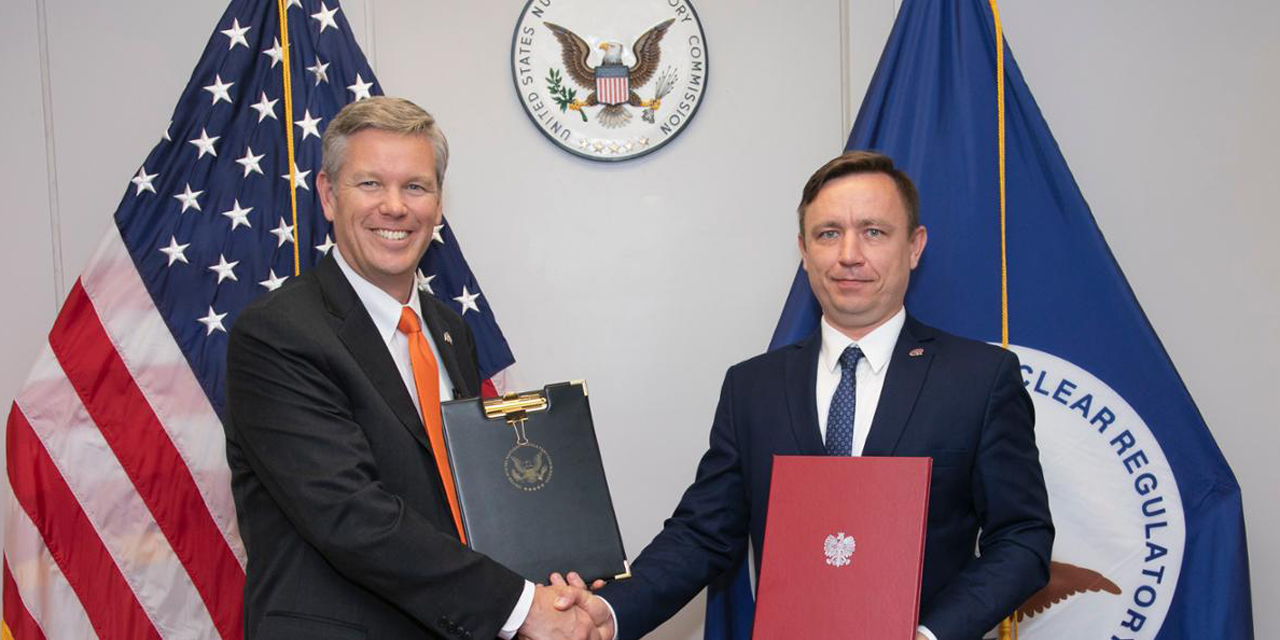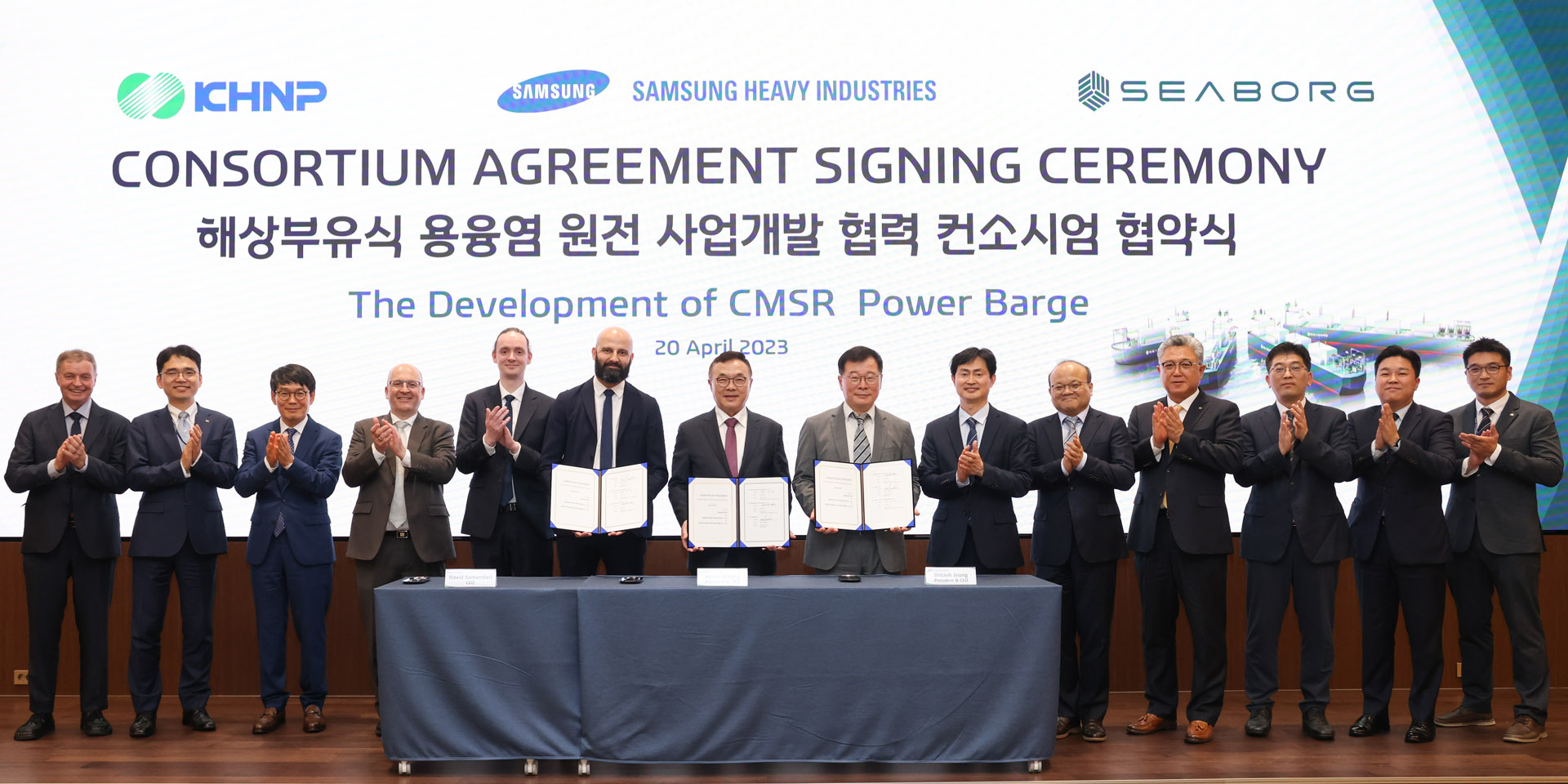U.S., Polish nuclear regulators renew pact

The Nuclear Regulatory Commission and Poland’s National Atomic Energy Agency (PAA) have renewed their cooperation agreement for the next five years.


The Nuclear Regulatory Commission and Poland’s National Atomic Energy Agency (PAA) have renewed their cooperation agreement for the next five years.
The Finnish company Steady Energy, a spinout entity from VTT Technical Research Centre of Finland, announced on June 27 that it has raised €2 million in seed funding led by VTT, Yes VC, and Lifeline Ventures. Steady Energy aims to build what it said would be the world’s first reactor-based heating plant by 2030. The company will use the funding to work on research and development to demonstrate the functionality of its LDR-50 plant by building a 1:1 scale mock-up powered by electric heat.

The “The State of Nuclear” panel discussion on June 13 at the 2023 American Nuclear Society Annual Meeting focused on how geopolitical issues are affecting federal, state, and international laws, regulations, and funding regarding nuclear technology. The discussion was chaired by ANS Executive Director/CEO Craig Piercy.

The latest National Nuclear Energy Public Opinion Survey by Bisconti Research, conducted from April 28 to May 5, indicated little awareness of small modular reactors (SMRs). Of 1,000 adults in the United States who were surveyed, only about 20 percent answered “yes” to the question “Have you heard anything about advanced-design nuclear power plants called Small Modular Reactors (SMRs)?” Sixty-seven percent answered “no,” and 14 percent responded “not sure.”

It has been said that the nuclear provisions in the Biden administration’s Inflation Reduction Act are strong enough to be stand-alone bills. The IRA contains various tax incentives for nuclear, to the point where it seems that few in Congress are questioning the importance of nuclear energy to the nation’s power grid and climate goals.

Six companies—NuScale Power, Romania’s nuclear plant operator Nuclearelectrica, E-Infra, Nova Power & Gas, Fluor Enterprises, and Samsung C&T Corporation—signed a memorandum of understanding on June 13 to collaborate on the deployment of NuScale’s VOYGR small modular reactor plants in Central and Eastern Europe, starting with Romania.

NuScale Power has signed an agreement with training and consulting firm Accelerant Solutions for the development and implementation of a reactor operator training program, the Portland, Ore.–based small modular reactor developer announced on June 7.
.jpg)
Ontario Power Generation—owner and operator of Canada’s Darlington and Pickering nuclear plants—and Poland’s ORLEN Synthos Green Energy (OSGE) have signed a letter of intent (LOI) that builds on the companies’ existing cooperation on the deployment of small modular reactors in Europe, OPG announced last week.

Andrew Paterson
Having worked at the U.S. Department of Energy for a decade (1997–2007) and across the energy sector on the Environmental Business International board for 30 years, I have witnessed firsthand the widely shared opinion that the “next big thing” in nuclear will be small modular reactors for urban centers and to provide both heat and power for a variety of energy-intensive sectors. To meet the decarbonization demands of these urban centers, the current energy landscape is pushing many countries away from a “renewables-only” strategy. For example, the German Energiewende (or “energy turnaround”) formally started around 2000 under then chancellor Gerhard Schroeder to phase out nuclear toward mostly renewables (with natural gas backup imported from Russia). As demonstrated by the 2022 gas supply shock and price spikes, Germany created its own nightmare: They now suffer the highest energy prices in Europe, have an unstable grid, and are forced to use more coal.
NuScale Power announced yesterday that it has joined the Romanian Atomic Forum, aka Romatom, as a supporting member “to champion the association’s nuclear energy goals and further the next generation of advanced nuclear technology experts, technologists, and operators in Romania.” The move further deepens the American small modular reactor company’s commitment to the deployment of a VOYGR SMR plant in the Central European state.

On the sidelines of the G7 summit in Hiroshima, Japan, over the weekend, the Biden administration and partners Japan, South Korea, and the United Arab Emirates announced a public-private commitment of up to $275 million to support the advancement of NuScale Power’s small modular reactor project in Romania.

NuScale Power and steel manufacturer Nucor have signed a memorandum of understanding to explore the deployment of NuScale’s VOYGR small modular reactor plants at Nucor’s scrap-based electric arc furnace (EAF) steel mills, the Portland, Ore.–based SMR developer announced Tuesday.

Lee
In his latest effort to promote the growth of nuclear energy in his state, Tennessee Gov. Bill Lee signed an executive order on Tuesday to establish the Tennessee Nuclear Energy Advisory Council.
“Tennessee is ready-made to lead America’s energy independence and drive continued economic growth with safe, clean, and reliable nuclear energy for the future,” Lee said at a news conference held at the University of Tennessee’s Knoxville campus to publicize the document. “Today, I’m signing an executive order that will continue our work to make Tennessee the number-one state for nuclear energy companies to invest and thrive, bringing greater opportunity and quality jobs for Tennesseans.”
NuScale Power has announced the opening of its fifth Energy Exploration (E2) Center, at the University Politehnica of Bucharest, in support of the small modular reactor developer’s ongoing collaboration with the U.S. and Romanian governments and Nuclearelectrica, operator of Romania’s Cernavoda nuclear power plant.

Just days after immediately achieving key-player status in the small modular reactor market with the unveiling of its AP300 SMR, Westinghouse Electric Company on May 9 announced the filing of the new unit’s preapplication regulatory engagement plan with the Nuclear Regulatory Commission.
The plan outlines the preapplication activities Westinghouse intends to carry out with NRC staff to support the AP300’s licensing. According to the announcement, the plan documents the basic design philosophy of the technology, an overview of the proposed licensing approach, and a timeline for the planned preapplication interactions between the NRC and Westinghouse, with the goal of soliciting agency feedback on noteworthy topics.

Dow and X-energy have announced the location of their Xe-100 small modular reactor deployment project: Dow’s UCC Seadrift Operations manufacturing site in Texas. According to a May 11 joint news release, the SMR plant will provide the Seadrift site with power and heat as the site’s existing energy and steam assets near the end of their operational lives.
NuScale Power and TerraPower both signed agreements earlier this week with South Korean entities to support development of the American firms’ respective reactor technologies.

Denmark-based Seaborg Technologies, developer of the compact molten salt reactor (CMSR), has teamed with two South Korean firms—shipbuilder Samsung Heavy Industries (SHI) and nuclear plant owner and operator Korea Hydro & Nuclear Power (KHNP)—to form a consortium for the development of floating nuclear plants featuring the CMSR. The consortium agreement was signed in Seoul on April 20.

The Korea Atomic Energy Research Institute (KAERI) and the government of Alberta have agreed on a comprehensive cooperation framework to explore the viability of using small modular reactors to help decarbonize the province—Canada’s biggest energy producer and its biggest polluter. The announcement comes the same week that Alberta’s United Conservative Party government released a climate plan aimed at reaching net zero by 2050.
Germany may have walked away from nuclear energy, but just across the border, Poland continues to stride confidently toward it.
After solidifying plans in February for deploying Westinghouse’s AP1000 reactors in Poland, Polskie Elektrownie Jądrowe (PEJ) on April 13 submitted an application to the Ministry of Climate and Environment for a decision-in-principle regarding the nation’s initial nuclear project—construction of an AP1000 plant at a site some 40 miles northwest of Gdansk, the capital of Poland’s Pomeranian province.